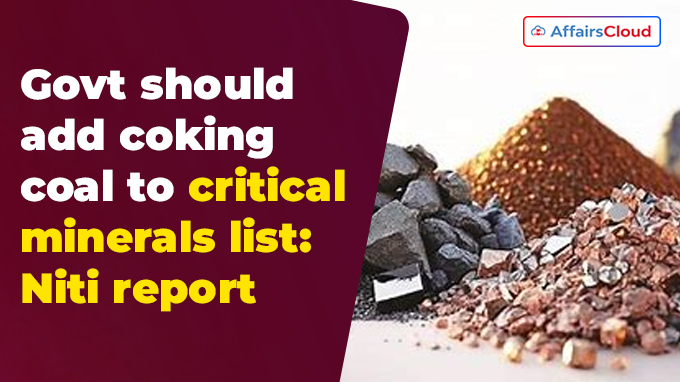
The National Institution for Transforming India(NITI) Aayog’s report titled ‘Enhancing Domestic Coking Coal Availability to Reduce the Import of Coking Coal‘ recommended that the Government of India(GoI) include coking coal in its list of critical minerals to enhance domestic production and reduce reliance on imports.
- The report emphasizes the strategic importance of coking coal for India’s steel industry and overall economic growth. It meets all the criteria to declare coking coal as a ‘critical mineral’ for India.
About Coking coal:
i.Coking coal is also known as metallurgical coal. It is a naturally occurring sedimentary rock found within the earth’s crust.
ii.It contains more carbon, less ash and less moisture than thermal coal.
iii.It is essential for steel production, constituting approximately 42% of the cost of steel.
Key Points:
i.Steel is essential for infrastructure and industry, making a stable coking coal supply vital for job creation and economic stability in India.
- Currently, India imports about 85% of its coking coal which is higher than that of the European Union(EU) (approximately 62%).
ii.India has 5.13 billion tonnes of prime coking coal and 16.5 billion tonnes of medium-quality coking coal, yet its production is underutilized.
iii.In the Financial Year 2023-24(FY24), Integrated Steel Plants(ISPs) imported 58 million tonnes(MT) of coking coal, costing over Rs 1.5 lakh crore.
iv.Public sector washeries operate at under 32% capacity, while private ones exceed 75%, indicating inefficiencies in the public sector.
v.The report calls for fully leveraging India’s proven reserves to meet the growing demand from steel mills, which consume approximately 70 million metric tons annually
vi.The report suggested to amend the Coal Bearing Areas (CBA) Act, 1957, to allow the SPV under PPP mode to remain a deemed lessee of Jharkhand even after majority shares are transferred to the private sector.
vii.Ministry of Coal should enable policy changes to allow joint ventures to sell byproducts (middling and tailing) from washeries.
Points to Note:
i.The Government has released a list of 30 critical minerals for India in 2023.
- These minerals are Antimony, Beryllium, Bismuth, Cobalt, Copper, Gallium, Germanium, Graphite, Hafnium, Indium, Lithium, Molybdenum, Niobium, Nickel, Platinum-group elements (PGEs), Phosphorous, Potash, Rare earth elements (REEs),Rhenium, Silicon, Strontium, Tantalum, Tellurium, Tin, Titanium, Tungsten, Vanadium,Zirconium, Selenium and Cadmium.
ii.India is the largest importer of coking coal with 58 million tonnes (MT) imported in FY24.
- India is also the second largest producer of crude steel after China.
iii.Australia, the United States of America(USA) and Russia are the largest suppliers of coking coal to India.
Note: EU has declared coking coal as a critical raw material along with 29 other raw materials which include ‘green energy’ minerals like lithium, cobalt, and rare earths.
Recent Related News:
In a landmark initiative to boost women-led businesses, Telangana became the first state in India to launch its own state chapter of National Institution for Transforming India(NITI) Aayog’s Women Entrepreneurship Platform (WEP).
- The ‘WEP Telangana Chapter’ was launched by BVR Subrahmanyam, Chief Executive Officer (CEO) of NITI Aayog in the presence of State Information and Technology(IT) and Industries secretary, Jayesh Ranjan and co-chair of WEP, Sangeetha Reddy in Hyderabad(Telangana).
About NITI Aayog:
Chief Executing Officer (CEO)- B. V. R. Subrahmanyam
Chairperson– Narendra Modi
Established – 2015




